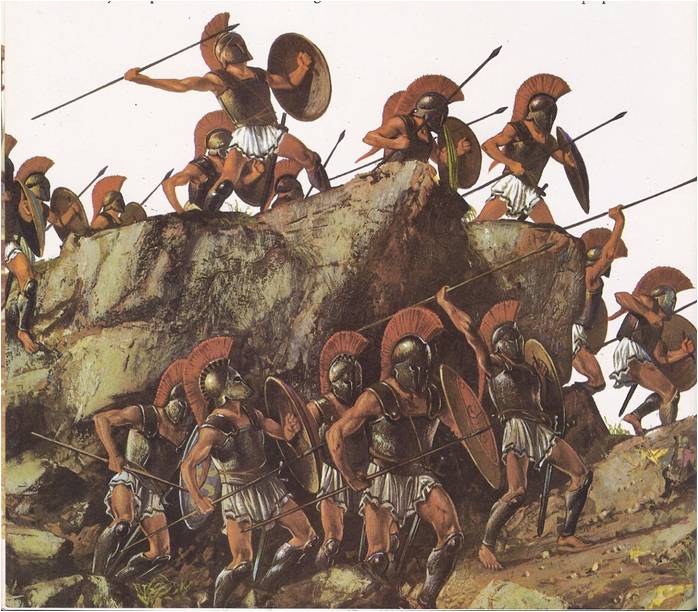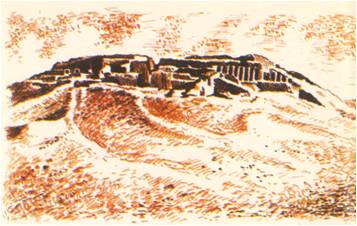In 343 B. C., the philosopher Aristotle left the quiet of his study and journeyed to Macedonia, a country in the mountain wilderness north of Greece. He had been hired to tutor the rowdy young son of a king. The boy, Alexander, was a yellow-haired thirteen-year-old. His manners were polite and he seemed to be clever enough, but he was wild. It was hard for him to pay attention to his studies. He much preferred galloping across the fields on his huge horse. He proudly told his new tutor that he had tamed the horse himself. When he did come to his lessons, instead of discussing arithmetic and Greek grammar, he chatted on about armies and his father’s campaigns and his own great plans to conquer the world. Alexander said he was a descendant of the family of Achilles – his mother had told him so. The Iliad, Achilles’ story, was the one book he loved. He carried it with him wherever he went and read it over and over until he knew it by heart. He dreamed of growing up to be a hero like the ones in Homer’s poem. He pestered Aristotle with questions about Greece and Athens, which he longed to visit. Aristotle said that it was very different from Macedonia. Philip of Macedon In those days Macedonia was just beginning to be a kingdom that civilized people talked about seriously. The Greeks still said it was a country of barbarians, but the Greeks called everyone who wasn’t Greek a barbarian. Macedonia was changing. Alexander’s father, King Philip, had spent his youth as a hostage in Greece and he had learned to love almost everything Greek. He had studied the language and tried to learn the ways of the people; but he had also heard the Greeks …
Read More »Greek Against Greek 430 B. C. – 404 B. C.
About 425 B. C., a lonely man, in a country that was not his own, sat down to write the story of a war that had begun six years before. Thucydides, an Athenian, had fought in the war’s first battles. He had been a general, in command of thousands of his city’s troops. Then he was ordered to go to the aid of another commander whose men were outnumbered. When he arrived, the battle had already been fought and lost. It was not his fault but the people of Athens were too anxious about the war to consider that. They stripped Thucydides of his command and forced him to leave his homeland. Now, while the war raged on, he could only watch and he was troubled by the things he saw. Athens and its rival Sparta were caught in a deadly struggle to see which would be the master of the Greek world. Men died, cities were destroyed and nothing was gained, but the war went on. Thucydides began to write about the senseless fighting, hoping that he might teach the men of another time to avoid war. He wrote about the ambassadors from the city of Corinth, who spoke to the Spartans in their assembly, warning them about Athens. “You have no idea what kind of people these Athenians are”, the Corinthians said, “how altogether different from you. They are always thinking up new schemes and they are quick to make plans and to do something about them; but you are happy with what you have and slow to do even what is necessary. The Athenians are bold and adventurous; you Spartans are cautious and afraid to trust your own strength. They love foreign adventure, which you hate, because they think there is something to win, while you think …
Read More »Greece Fights for its Life 499 B. C.-479 B. C.
Across the Aegean, from the oriental court of King Darius of Persia, came messengers to all the city-states of mainland Greece. Their words were smooth, their smiles like sneers and they demanded gifts for their master – earth and water, the ancient tokens of tribute and surrender. The Greeks in Asia Minor already knew the Persians – too well; once the smiling messengers had come to the cities. After the messengers, the soldiers came, attacking the little poleis, one by one, until all of them were taken. Nothing could stop the Persian armies. From the capital, deep in Asia, they had pushed westward and they had gone so far that the journey home was counted in months instead of miles. They had conquered Egypt and Phoenicia, the kingdom of sailors. Now Darius, their king, meant to add Greece to his empire. He would do it quietly, if the Greeks gave up without a fight. If not, he would send his soldiers and take Greece by force. When the messengers arrived, the men of some poleis bowed their heads and gave the tokens; if Darius came, they would not fight. Others refused. The Spartans dropped the Persian ambassadors down a well and told them to find their earth and water there. At Athens, Darius’ messengers were thrown into a pit. Darius was not sorry that the Athenians were so bold. He had a grudge to settle with them and he looked forward to seeing his troops destroy their city. Seven years before, in 499 B. C., Athens and Eretria, another city on the mainland, had sent help to the Greeks in Asia Minor. When Darius was told about it, he had sneered, “The Athenians – who are they?” He had called for his bow and arrow, which he shot toward the …
Read More »Civilization comes to India 3500 B.C to 200 B.C.
For thousands of years during the Stone Age, only scattered groups of people had lived in India. With only the simplest tools of bone, wood and stone, they hunted and gathered food. Cut off from other peoples by the mountain and the sea, the first Indians made few advances in their primitive way of life. Then, sometime between 3500 B. C., new settlers began to appear along the Indus River Valley in northwestern India, a region that would be called West Pakistan thousands of years later. It seems almost certain that these newcomers were from the mountains and plateaus to the northwest, the modern lands of Iran and Afghanistan. When they arrived, the new commers were already able to make pottery, to farm and to raise animals. Most likely too, some of them knew of the cities far to the west, on the plains of Mesopotamia. From those more advanced cities, the Indus valley people learned about new objects, such as copper and bronze tools. They also heard tales about how those distant peoples controlled the river’s water, or how they scratched signs in clay tablets to record words. However much they may have borrowed, the Indus Valley people worked out their own ways. By 2500 B. C., a distinctive civilization had begun to develop along the Indus River. The river itself played an important part in this civilization. Sometimes it flooded so badly that it wiped out villages and fieldworks, or even changed its course entirely. Usually however, it overflowed just enough to leave a rich soil for each season’s crops and the people worked together to take advantage of it. The river also made it easy for the various settlements to exchange goods and ideas. The People of the Indus Of the dozens of villages, two soon grew …
Read More »The Gift of the Nile 3300 B.C. – 30 B.C.
It was around 3500 B.C. and as it did every year around the middle of July, the Nile had begun to rise. Carrying tons of soil, the waters poured down from the mountains of Africa, where the rain and melting snow fed the streams that surfed northward into one great river. Wherever it ran free of the rocky canyons, the river overflowed onto the dry fields along its banks. It lapped against the villages on high ground and spread to market towns on the edges of the dessert. Moving northward, the river engulfed the entire Delta region and then emptied into the Mediterranean Sea. By mid-November the waters receded, leaving a thick, dark mud on the fields and in the canals. Near one of the largest towns far up the Nile, the farmers stood waiting at the edge of the fields. Then from the town came the king, followed by guards, priests and servants carrying large fans. The king wore a high white crown and carried a hoe. Scooping some fresh mud out of an irrigation ditch, he placed it in a basket held by an attendant. While the priests chanted, the mud was spread over the field. Now the farmers could plant in the fertile earth left by the floodwaters. The king, who was responsible for the well-being of his people, had performed a great duty. As his white crown indicated, this king ruled only in Upper Egypt. In the Delta to the North there was another king, who wore a red crown. For many years the people of Lower and Upper Delta had been fighting and raiding each other’s towns. However, they all had common ancestors who had come from Africa to the south, from Libya to the west and from Asia to the north and east. Through …
Read More »




